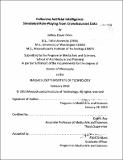| dc.contributor.advisor | Deb K. Roy. | en_US |
| dc.contributor.author | Orkin, Jeffrey David | en_US |
| dc.contributor.other | Massachusetts Institute of Technology. Department of Architecture. Program in Media Arts and Sciences. | en_US |
| dc.date.accessioned | 2013-06-17T19:54:33Z | |
| dc.date.available | 2013-06-17T19:54:33Z | |
| dc.date.copyright | 2013 | en_US |
| dc.date.issued | 2013 | en_US |
| dc.identifier.uri | http://hdl.handle.net/1721.1/79304 | |
| dc.description | Thesis (Ph. D.)--Massachusetts Institute of Technology, School of Architecture and Planning, Program in Media Arts and Sciences, 2013. | en_US |
| dc.description | Cataloged from PDF version of thesis. | en_US |
| dc.description | Includes bibliographical references (p. 173-178). | en_US |
| dc.description.abstract | Collective Artificial Intelligence (CAl) simulates human intelligence from data contributed by many humans, mined for inter-related patterns. This thesis applies CAI to social role-playing, introducing an end-to-end process for compositing recorded performances from thousands of humans, and simulating open-ended interaction from this data. The CAI process combines crowdsourcing, pattern discovery, and case-based planning. Content creation is crowdsourced by recording role-players online. Browser-based tools allow nonexperts to annotate data, organizing content into a hierarchical narrative structure. Patterns discovered from data power a novel system combining plan recognition with case-based planning. The combination of this process and structure produces a new medium, which exploits a massive corpus to realize characters who interact and converse with humans. This medium enables new experiences in videogames, and new classes of training simulations, therapeutic applications, and social robots. While advances in graphics support incredible freedom to interact physically in simulations, current approaches to development restrict simulated social interaction to hand-crafted branches that do not scale to the thousands of possible patterns of actions and utterances observed in actual human interaction. There is a tension between freedom and system comprehension due to two bottlenecks, making open-ended social interaction a challenge. First is the authorial effort entailed to cover all possible inputs. Second, like other cognitive processes, imagination is a bounded resource. Any individual author only has so much imagination. The convergence of advances in connectivity, storage, and processing power is bringing people together in ways never before possible, amplifying the imagination of individuals by harnessing the creativity and productivity of the crowd, revolutionizing how we create media, and what media we can create. By embracing data-driven approaches, and capitalizing on the creativity of the crowd, authoring bottlenecks can be overcome, taking a step toward realizing a medium that robustly supports player choice. Doing so requires rethinking both technology and division of labor in media production. As a proof of concept, a CAI system has been evaluated by recording over 10,000 performances in The Restaurant Game, automating an Al-controlled waitress who interacts in the world, and converses with a human via text or speech. Quantitative results demonstrate how CAI supports significantly more open-ended interaction with humans, while focus groups reveal factors for improving engagement. | en_US |
| dc.description.statementofresponsibility | by Jeffrey David Orkin. | en_US |
| dc.format.extent | 178 p. | en_US |
| dc.language.iso | eng | en_US |
| dc.publisher | Massachusetts Institute of Technology | en_US |
| dc.rights | M.I.T. theses are protected by
copyright. They may be viewed from this source for any purpose, but
reproduction or distribution in any format is prohibited without written
permission. See provided URL for inquiries about permission. | en_US |
| dc.rights.uri | http://dspace.mit.edu/handle/1721.1/7582 | en_US |
| dc.subject | Architecture. Program in Media Arts and Sciences. | en_US |
| dc.title | Collective artificial intelligence : simulated role-playing from crowdsourced data | en_US |
| dc.title.alternative | Simulated role-playing from crowdsourced data | en_US |
| dc.type | Thesis | en_US |
| dc.description.degree | Ph.D. | en_US |
| dc.contributor.department | Program in Media Arts and Sciences (Massachusetts Institute of Technology) | |
| dc.identifier.oclc | 847528494 | en_US |
